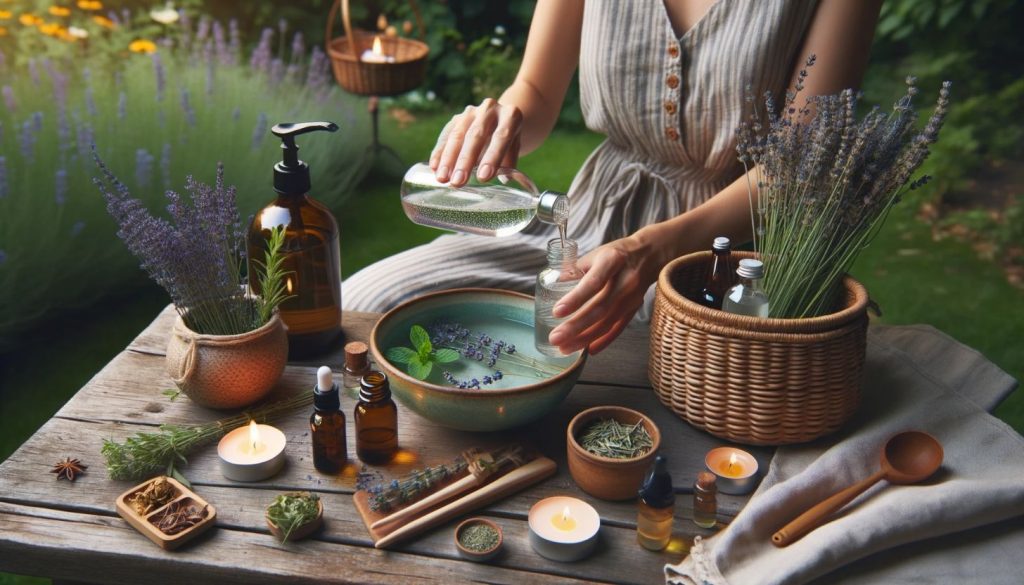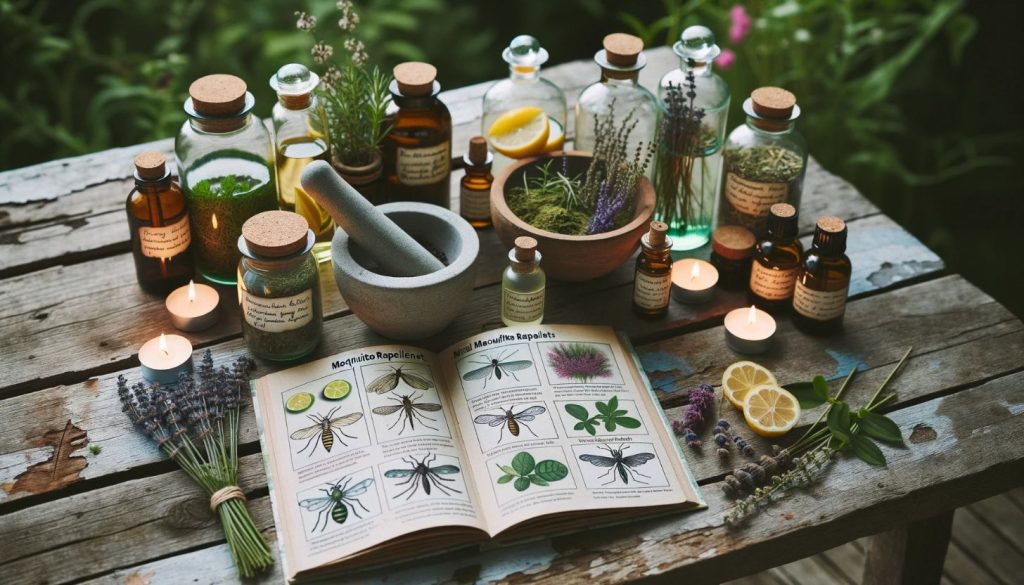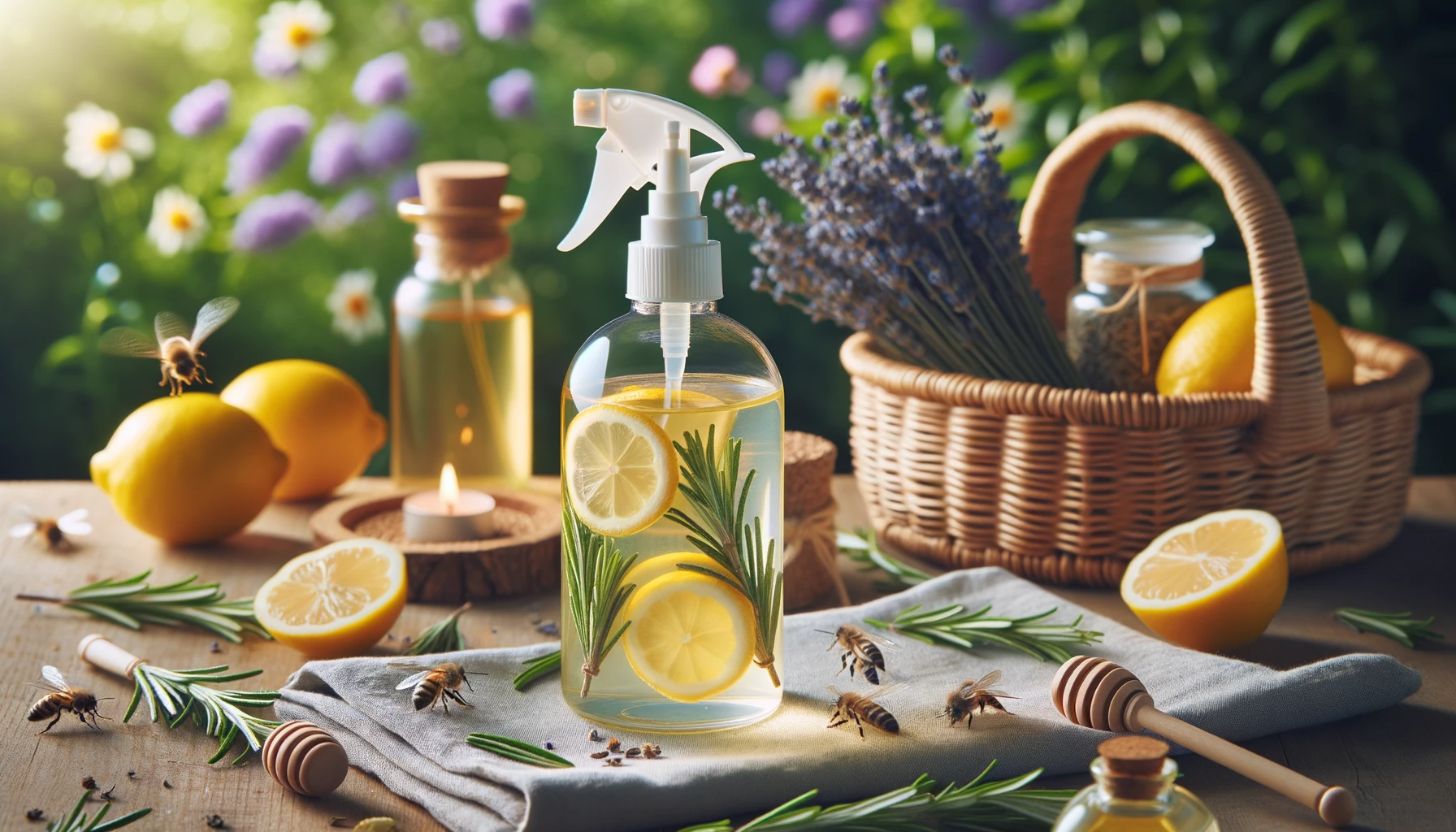Summer is approaching fast, and with it come the pesky mosquitoes. These bloodsucking insects can ruin your outdoor activities and even pose a health risk with their bites. Fortunately, you don’t have to rely on commercial mosquito repellents that may contain harmful chemicals. With some simple ingredients and a little know-how, you can create your own DIY mosquito repellents that are safe, effective, and easy on the wallet.
DIY mosquito repellents are becoming increasingly popular as people seek natural alternatives to chemical products. By making your own repellent, you can control the ingredients and tailor the scent to your preference. Plus, you’ll feel good about using a product that’s eco-friendly and won’t harm other beneficial insects.
In this section, we’ll explore everything you need to know about making DIY mosquito repellents, including natural ingredients, essential oils, and non-repellent methods. Whether you’re planning a camping trip, a backyard barbecue, or just want to enjoy your evening on the porch without being bitten, these tips will help you keep mosquitoes at bay.
Key Takeaways
- DIY mosquito repellents are a natural and cost-effective alternative to commercial products.
- By making your own mosquito repellent, you can control the ingredients and tailor the scent to your preference.
- Natural ingredients, essential oils, and non-repellent methods are all effective options for DIY mosquito control.
- DIY mosquito repellents are eco-friendly and won’t harm other beneficial insects.
- Creating your own mosquito repellent is easy and fun!
Understanding Mosquitoes and Why Repellents Are Important
In order to understand the importance of mosquito repellent solutions, it is crucial to know a bit about mosquitoes themselves. Mosquitoes are a type of flying insect belonging to the Culicidae family. These small, slender insects have a pair of wings, long legs, and a proboscis that females use to feed on the blood of humans and animals.
While male mosquitoes primarily feed on nectar and other plant-based substances, females require a blood meal in order to produce their eggs. When a mosquito bites, it injects saliva into the skin of the host, which can cause itching and irritation.
In addition to being a nuisance, mosquitoes can also transmit diseases such as malaria, dengue fever, and the Zika virus. This is why effective mosquito repellents are essential for protecting yourself and your family from these diseases.
Mosquito Repellent Solutions
There are various types of mosquito repellent solutions available on the market, ranging from sprays and lotions to candles and coils. However, many of these products contain chemicals that can be harmful to the environment and may cause skin irritation or other adverse reactions.
To avoid the potential risks associated with commercial mosquito repellents, many people are turning to natural and DIY mosquito repellent solutions. These remedies are not only safer but also often more cost-effective and customizable to individual needs.
In the following sections, we will explore different natural mosquito repellents, DIY mosquito repellent recipes, and non-repellent DIY mosquito control methods that can help keep mosquitoes at bay and provide a safer and more enjoyable outdoor experience.

“Effective mosquito repellents are essential for protecting yourself and your family from diseases.”
Natural Mosquito Repellents: The Power of Mother Nature
When it comes to repelling mosquitoes, nature has provided us with powerful tools that have been used for centuries. Using natural bug repellents is a safe and effective way to keep mosquitoes away without exposing yourself or your family to harmful chemicals. Here are some of the best natural mosquito repellents you can use:
Citronella Oil
Citronella oil is a popular natural mosquito repellent that is derived from plants in the Cymbopogon family. This oil has a strong, citrus-like scent that masks the scents that mosquitoes are attracted to. You can use citronella oil in a diffuser, apply it topically, or create your own citronella candles.
Lemon Eucalyptus Oil
Lemon eucalyptus oil is another effective natural mosquito repellent. This oil is extracted from the leaves of the lemon eucalyptus tree and contains a compound called PMD that has been shown to repel mosquitoes. You can create your own DIY mosquito repellent spray using lemon eucalyptus oil and water.
Clove Oil
Clove oil is a potent natural mosquito repellent that has been used for centuries. This oil is derived from the buds of the clove plant and has a strong, spicy aroma that mosquitoes dislike. You can use clove oil in a diffuser, apply it topically, or create your own clove oil spray to use as a mosquito repellent.
Neem Oil
Neem oil is a natural insecticide that is derived from the neem tree. This oil has been used for centuries in India to repel mosquitoes and other insects. Neem oil contains compounds that disrupt the insect’s hormonal balance, making it an effective natural mosquito repellent. You can use neem oil in a diffuser or create your own neem oil spray.
Other Natural Mosquito Repellents
Other natural mosquito repellents include lavender, peppermint, and rosemary essential oils. You can use these oils in a diffuser, apply them topically, or create your own DIY mosquito repellent spray. Additionally, garlic, catnip, and marigolds have been shown to repel mosquitoes when planted in your garden.
Using natural mosquito repellents is a safe and effective way to keep mosquitoes away. However, it’s important to keep in mind that natural repellents may not be as long-lasting as synthetic repellents and may need to be reapplied more frequently. Experiment with different natural mosquito repellents to find the ones that work best for you.

DIY Mosquito Repellent Recipes: Simple and Effective
Creating your own mosquito repellent is a cost-effective and natural alternative to commercial products. With a few simple and readily available ingredients, you can make your own effective mosquito repellent that is tailored to your preferences.
Lemon Eucalyptus Oil Mosquito Repellent
Lemon eucalyptus oil is an effective and natural mosquito repellent. It contains citronellal, which has similar properties to DEET, a common chemical found in commercial mosquito repellents.
| Ingredients | Instructions |
|---|---|
| Lemon eucalyptus oil | Combine 10-20 drops of lemon eucalyptus oil with 2 tablespoons of a carrier oil, such as jojoba or olive oil. Apply to exposed skin. |
Garlic Mosquito Repellent Spray
Garlic is a natural insecticide and can be used to repel mosquitoes. When garlic is ingested, it produces an odor that cannot be detected by humans but is unpleasant for mosquitoes.
| Ingredients | Instructions |
|---|---|
| 2 garlic bulbs | Peel and crush 2 garlic bulbs and mix with 1 cup of water. Let the mixture sit overnight, then strain and pour into a spray bottle. Spray onto skin and clothing. |
Vinegar and Essential Oil Mosquito Repellent
Vinegar is a natural mosquito repellent and can be combined with essential oils to create an effective DIY repellent.
| Ingredients | Instructions |
|---|---|
| 1/2 cup of vinegar | Combine 1/2 cup of vinegar with 20-30 drops of an essential oil such as lavender or peppermint. Apply to exposed skin. |
Creating your own mosquito repellent is easy and effective. By using natural ingredients, you can keep mosquitoes at bay without exposing yourself to harmful chemicals. Experiment with different recipes and find the one that works best for you.

Natural Mosquito Repellents: The Power of Mother Nature
If you’re looking for a natural approach to repelling mosquitoes, then Mother Nature has got you covered. There are many natural ingredients that can help keep mosquitoes at bay without the use of chemicals. In this section, we’ll explore some natural mosquito repellent ideas and homemade mosquito repellents you can make with simple ingredients.
Essential Oils: The Aromatic Defense Against Mosquitoes
Essential oils are a popular natural mosquito repellent, and for a good reason. These oils contain compounds that mosquitoes find repulsive, but that humans find pleasing. Some of the most effective essential oils for repelling mosquitoes include:
- Lavender oil: Not only does it smell great, but it also helps repel mosquitoes.
- Peppermint oil: The smell is too strong for mosquitoes to handle, making it an effective repellent.
- Lemongrass oil: Mosquitoes dislike the smell of lemongrass, making it a natural repellent.
- Eucalyptus oil: The scent of eucalyptus is known to repel mosquitoes, making it an effective natural repellent.
You can use essential oils in various ways to create natural mosquito repellents. Mix a few drops of your preferred essential oils with a carrier oil like coconut or olive oil and apply it to your skin. You can also add a few drops of essential oil to water and use it as a natural mosquito spray.

Herbs and Spices: More Than Just Flavor Enhancers
Many herbs and spices commonly found in your kitchen can also repel mosquitoes. Here are some examples:
| Herbs and Spices | How to Use |
|---|---|
| Basil | Plant basil in your garden or crush the leaves and rub them on your skin. |
| Garlic | Eat garlic or rub it on your skin. Alternatively, you can spray garlic water around your yard. |
| Citronella | Burn citronella candles or use citronella oil as a repellent. |
| Pepper | Mix pepper with water and spray it around your yard. |
Using these natural herbs and spices can help repel mosquitoes, and they can also add flavor to your meals.
By harnessing the power of Mother Nature, you can create effective and natural mosquito repellents. Whether you prefer essential oils or herbs and spices, these natural mosquito repellent ideas can help keep mosquitoes at bay to enjoy your summer evenings without pesky mosquito bites.
Non-Repellent DIY Mosquito Control Methods
When creating a DIY mosquito control plan, repellents are not the only solution. There are several non-repellent techniques you can implement to reduce the number of mosquitoes in your environment. Here are some effective homemade mosquito traps that you can use:
| Mosquito Trap Type | Description |
|---|---|
| Soda Bottle Trap | This trap is simple to make with a 2-liter soda bottle, brown sugar, and yeast. Cut the top off the bottle, invert it, and add the sugar and yeast mixture. The mixture will ferment and release carbon dioxide which will attract the mosquitoes. Once the mosquitoes enter the trap, they won’t be able to escape. |
| UV Light Trap | This type of trap uses UV light to attract mosquitoes which are then sucked into a container by a fan. You can easily create a basic version of this trap using a fan and a sheet of cardboard covered in adhesive tape. Place the fan behind the cardboard sheet, with the tape side facing the fan, and switch on the UV light. The mosquitoes will be attracted to the light and will be stuck to the tape when they try to reach it. |
| Mosquito Netting | If you’re looking for a more passive solution, mosquito netting is a great option. Covering your windows and doors with mosquito netting will help prevent mosquitoes from entering your home. You can also use netting over your outdoor seating areas to create a bug-free zone. |
Using these non-repellent DIY mosquito control methods in combination with your homemade repellents can help create a more effective plan for keeping mosquitoes away from you and your environment.

Safety Measures: Using Mosquito Repellents Correctly
DIY mosquito repellents are a great way to keep mosquitoes at bay during the summer months. However, it’s important to use them correctly to ensure maximum effectiveness and safety. Here are some safety measures to keep in mind when using natural mosquito repellents:
- Always follow the recipe carefully and measure ingredients accurately. Using too much or too little of a particular ingredient can affect the effectiveness of the repellent.
- Before applying DIY mosquito repellents to your skin, do a patch test on a small area to make sure you are not allergic to any of the ingredients.
- Do not apply mosquito repellents to broken or irritated skin.
- Wash your hands thoroughly after applying mosquito repellents.
- Avoid getting DIY mosquito repellents in your eyes, nose, or mouth. If this happens, rinse the affected area with water.
- Do not use mosquito repellents on babies under 2 months old.
- When using mosquito repellents on children, make sure to apply it yourself and avoid getting it in their eyes, nose, or mouth.
- Store DIY mosquito repellents in a cool, dry place away from children and pets.
Using natural mosquito repellents is a safe and effective way to enjoy a mosquito-free summer. Keep these safety measures in mind and enjoy the great outdoors without the annoyance of mosquito bites.

Bug-Proofing Your Outdoor Space: Additional Tips and Tricks
While DIY mosquito repellents are an effective solution, there are additional measures you can take to create a bug-free outdoor space and make the most out of your summer. Here are some natural bug repellents and mosquito repellent ideas:
- Plant mosquito-repelling plants: Certain plants like lavender, citronella, and basil have natural mosquito-repelling properties. Plant these around your outdoor area to keep mosquitoes away.
- Use outdoor fans: Mosquitoes are weak fliers, and outdoor fans can disrupt their flight paths, keeping them away from your space.
- Create a homemade mosquito trap: You can easily create a mosquito trap using a plastic bottle, sugar, yeast, and water. Mosquitoes are attracted to the carbon dioxide released from the yeast and will get trapped inside the bottle.
- Keep your outdoor space clean: Mosquitoes are attracted to standing water, as it is where they lay their eggs. Make sure to get rid of any standing water sources around your outdoor space, including in buckets, plant saucers, and birdbaths.
By combining these natural bug repellents and mosquito repellent ideas with your DIY mosquito repellents, you can create a truly bug-free outdoor space. Enjoy a summer of outdoor fun without annoying mosquito bites!

Conclusion
As summer approaches and mosquitoes become a nuisance, DIY mosquito repellents offer a safe, cost-effective, and customizable solution. By harnessing the power of natural ingredients like essential oils and herbs, you can create repellents that not only keep mosquitoes at bay but also align with your preferences.
Remember to use DIY mosquito repellents safely by following instructions, conducting patch tests, and keeping them out of reach of children and pets. Additionally, consider non-repellent DIY mosquito control methods such as homemade traps and maintaining a mosquito-free outdoor space.
With the knowledge and tips provided, you can enjoy a mosquito-free summer, protect yourself and your loved ones from mosquito-borne diseases, and embrace the great outdoors without pesky mosquito bites. Happy mosquito-free adventures!
FAQ
Are DIY mosquito repellents safe to use?
Yes, DIY mosquito repellents can be safe to use as long as you follow the proper instructions and use them correctly. It’s important to use high-quality ingredients and test the repellents on a small patch of skin before applying them to larger areas.
How effective are homemade mosquito repellents?
Homemade mosquito repellents can be effective, but their effectiveness may vary depending on the ingredients used and individual factors. Natural ingredients like essential oils and herbs can repel mosquitoes, but they may not provide the same level of protection as commercial repellents.
Can I use DIY mosquito repellents on children?
It’s important to be cautious when using DIY mosquito repellents on children. Some essential oils and ingredients may not be suitable for young children, so it’s best to consult with a healthcare professional before applying homemade repellents on children.
How long does DIY mosquito repellent last?
The duration of protection offered by DIY mosquito repellents can vary depending on the ingredients used. Generally, homemade repellents may need to be reapplied more frequently compared to commercial products. It’s recommended to reapply the repellent every few hours for optimal results.
Can I use DIY mosquito repellents indoors?
DIY mosquito repellents can be used indoors, but it’s important to ensure proper ventilation and avoid excessive application. Some ingredients may have strong scents or irritate the respiratory system, so it’s best to use them in well-ventilated areas.
Are DIY mosquito repellents effective against all types of mosquitoes?
DIY mosquito repellents can help repel a variety of mosquitoes, but their effectiveness may vary. Different species of mosquitoes may have varying responses to certain ingredients, so it’s important to experiment and find what works best for your specific area and mosquito population.
Can DIY mosquito repellents prevent mosquito-borne diseases?
While DIY mosquito repellents can help reduce mosquito bites, they may not fully prevent mosquito-borne diseases. It’s important to follow other preventive measures like wearing protective clothing, using mosquito nets, and eliminating mosquito breeding sites to minimize the risk of mosquito-borne diseases.
Can I combine different DIY mosquito repellents?
It’s generally safe to combine different DIY mosquito repellents, but it’s important to consider the ingredients used and their potential interactions. Some essential oils or ingredients may have conflicting properties or cause skin irritation when combined, so it’s recommended to research the individual ingredients before creating a combination.




